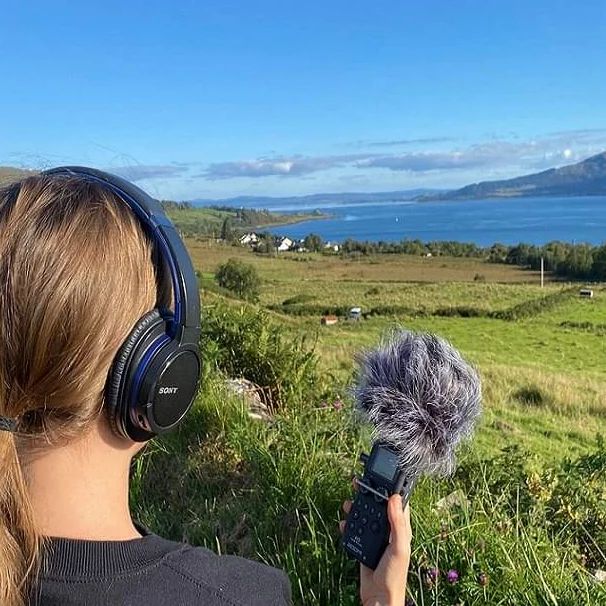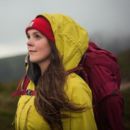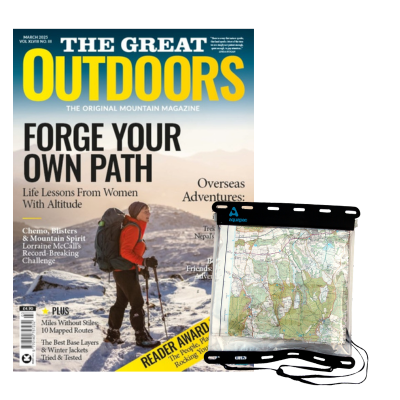Composer and violinist Lisa Robertson connects people both with the Gaelic language and her landscape’s local ecology through contemporary classical music.
Growing up in Morvern, surrounded by mountains and a stone’s throw from the sea, Lisa Robertson had the best of both worlds. She recalls character-building but joyful experiences outdoors. Even now, the outdoors is still where her imagination thrives best especially during the Autumn and Winter when the ever-changing quality of the light is magical. When she’s not exploring the woods and snow-covered peaks on her skis or swimming at sunrise, Lisa, 31, can be found composing and playing music.
Main image: Field recording at home | Credit: Lisa Robertson
Here, we asked her about the influence of traditional Gaelic music on her compositions, how she hopes her music will shift cultural conversations around the climate crisis and about a particularly moving piece work; her piece am fìor-eun - a Gaelic word for eagle meaning ‘true bird’ – which was performed by the Royal Scottish National Orchestra in 2023 putting the local ecology in the spotlight.
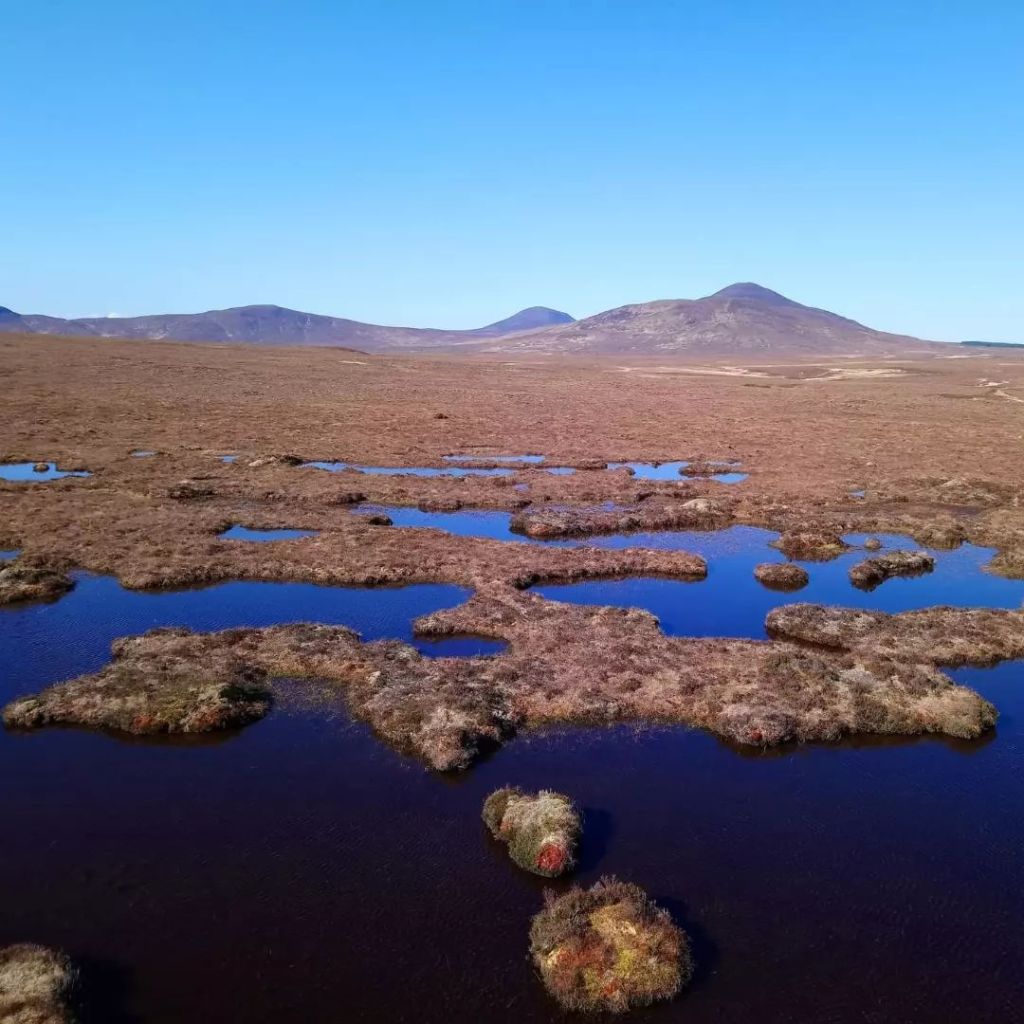
Forsinard Flows National Nature Reserve. Credit: Lisa Robertson
TGO: Growing up in the West Highlands, can you recall some formative experiences outdoors?
Lisa: Most of my memories from growing up were outdoors, honestly! My sisters and I spent a huge amount of time outdoors and were so lucky to live in Morvern in a safe, rural place where we could explore freely. My family and I had the best of both worlds being surrounded by mountains while also living right by the sea. We would spend a lot of time in or on the water as well as roaming the hills. I recall a lot of character-building experiences outdoors; the challenges and the joys of being freezing cold, tired and wet but feeling exhilarated and experiencing breathtaking surroundings while having so much fun. Growing up with the mountains as a playground for my imagination to develop, I find it interesting now that the outdoors is still where my creativity thrives best, perhaps owing to those formative experiences.
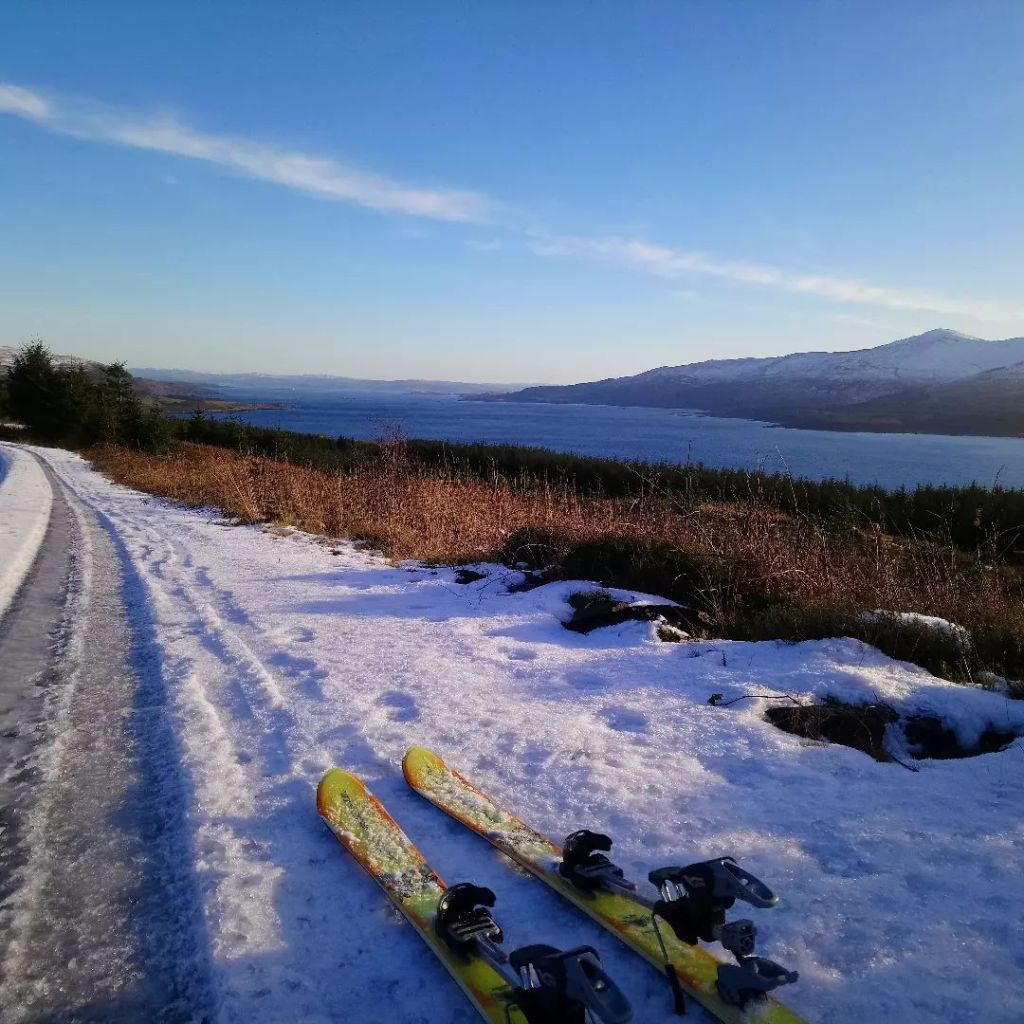
Skiing home. Credit: Lisa Robertson
TGO: What draws you out into nature during the colder months?
Lisa: I absolutely love the stunning, ever-changing quality of the light during Autumn and Winter. It can be so intensely beautiful and just magical. The view from my home, with winter light falling on the Sound of Mull, is breathtaking. I love swimming in the sea during Winter and have had beautiful moments at either sunrise or sunset where it feels like swimming through gold.
Perhaps above all things, I love skiing. As children, we were so lucky to live close enough to Nevis Range and go skiing every weekend in winter which developed my life-long passion. The combination of adrenaline-filled moments high in the mountains, in nature, is perfect for me. Ski touring and the freedom to explore snowy spots wherever I can find them has been a real joy in recent years. As much as I’m loving summertime climbing just now, I’m already itching for Winter to get back on my skis!
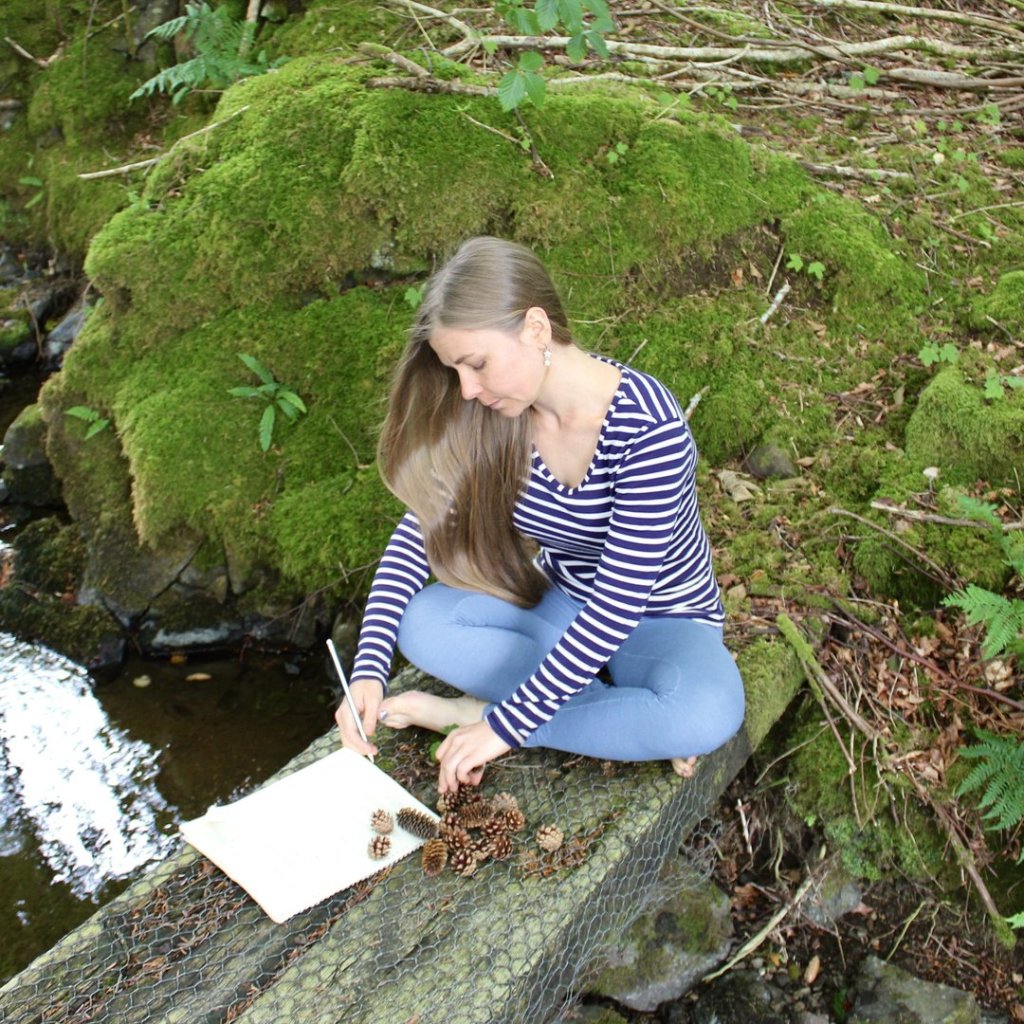
Composing in her element. Credit: Lisa Robertson
TGO: The perception of some rural Scottish communities is one of great lyricism and musicality through a long storytelling tradition. Was this your experience and, if so, did this help hone an innate composer’s ear?
Lisa: I certainly heard a lot of traditional music while growing up, with Gaelic singing at local Mòd competitions and attending traditional village hall ceilidhs. The influence of these early and continuing experiences was certainly important and is at the core of my music, both consciously and subconsciously. A lot of the traditional cultural material was very in tune with the local environment.
I like the idea that my music is coming from the same place. I feel a deep connection to the cultural material of my local area, Morvern, and like to consider my work as honouring and continuing that tradition, taking it in a new and different direction.
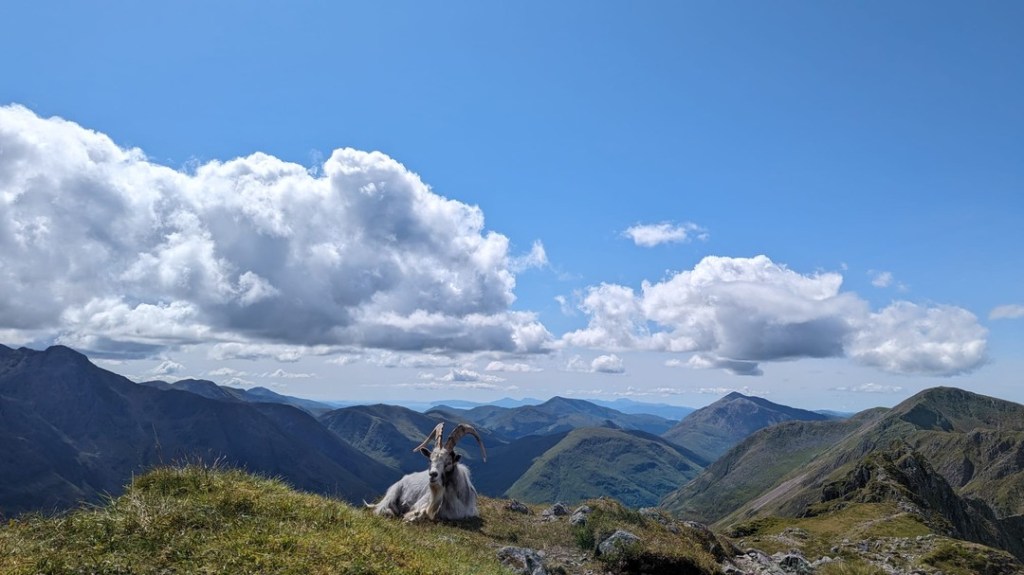
In good company on the Aonach Eagach ridge. Credit: Lisa Robertson
TGO: When did you first pick up a violin and what motivated you to continue to develop your talents?
Lisa: Coming from a small, remote place, I was so lucky that there happened to be a violin teacher who came to the neighbouring village every week. This was one of the only activities available outside school so lots of the children learned violin. I started when I was six. I just really took to it, and it’s always been central to my life. I love the feeling of playing with other people, especially in orchestras – there’s nothing like it!
I started composing at university and began to receive positive feedback and encouragement. I gained the confidence to explore my musical voice and interests and found my distinct style, which is when I began to combine my musical life with my love of the outdoors and the influence of nature. It felt like a journey, like climbing a ladder (or a mountain!) but I suppose, at some point, I could say it had become my career.
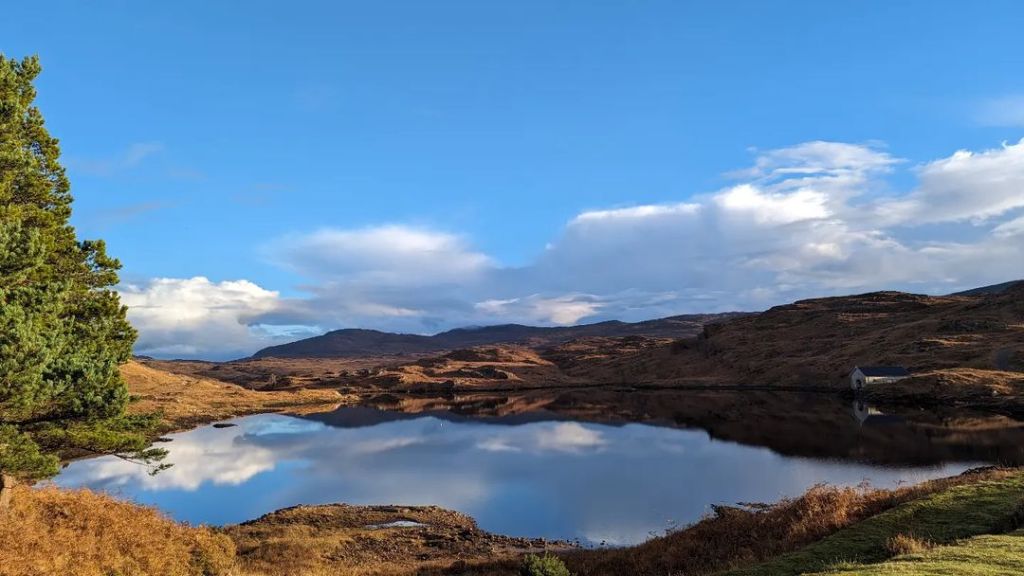
Autumn in Morven. Credit: Lisa Robertson
TGO: Can you describe how you first came to see music as a medium which could sonically and emotively represent nature?
Lisa: I heard music by other composers who imitated nature, such as Messiaen with his famous exploration of birdsong. However, I didn’t feel a connection to places like my own home in the music I heard from such composers. I always found the natural sounds around my home so wild, visceral and emotional. I thought, why not try to create music which sounded like that? I hadn’t heard music before which imitated seabirds so that was the first step I took.
I have always felt a connection to the calls of some seabirds and noticed how they seem to have an almost human emotional quality sometimes. Around these seabird sounds I tried to embody the visceral wildness of the North-West Highlands and its coastal areas with the wind and the sea. I want my music to evoke the feeling I can get from standing on a west coast shore on a wild and stormy day, or in a misty glen in the early morning; those magical, fleeting moments where all the senses are heightened. I also find that nature or weather words – such as stormy, misty and sunny – can describe the musical feeling I’m aiming for perfectly and I often write them in my scores.
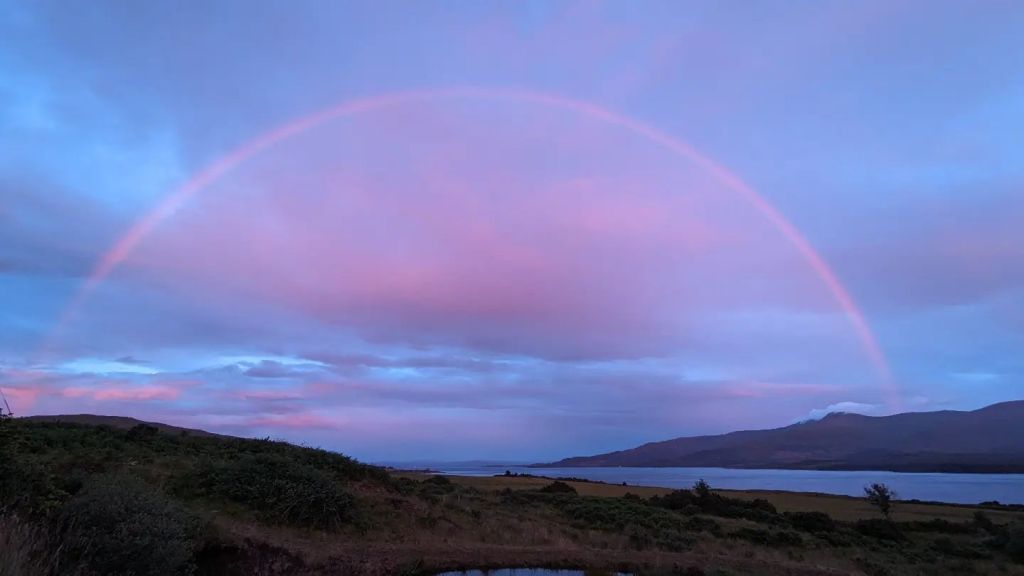
A sunset rainbow over Lochaline. Credit: Lisa Robertson
TGO: Why is it important to you to use your music to spotlight the current climate crisis?
Lisa: I feel that music and culture as a whole can play a large role in prompting conversations while sparking and supporting the massive cultural shifts which need to happen if we are to combat the climate crisis. It’s important for me to contribute to the growing body of work in the cultural sphere which addresses it.
I am not so much trying to tell people about the climate crisis itself, as I’m assuming that most people in the audience are largely on the same page about it already. Rather, it’s about giving people an emotional, creative space in which to explore those overwhelming feelings that most of us have when it comes to the climate crisis – to experience those feelings collectively and to have conversations about it. Some of my pieces address very specific issues too, like how climate change is affecting the local environment, which might not be widely known about. I think highlighting these issues can bring the crisis more to the forefront of our minds, as evidence that it is happening right on our doorstep.
TGO: What does it mean to you as a composer for your music to put the Gaelic language centre stage both at home and internationally?
Lisa: Using Gaelic language is incredibly important to me for so many reasons. Gaelic is very deeply part of my home area, Morvern, which was once a thriving Gaelic community. I consider the place to be a part of me and my music and Gaelic language and culture is really at the heart of that. Speaking the language gives you access to understanding the place names, songs and poetry that show how people once interacted with the places around us.
Speaking Gaelic and using it in my music makes me feel connected to all of this legacy but Gaelic is also so beautiful and expressive that I am deeply drawn to words, concepts, poetry and songs artistically aside from any other motives. With the state of Gaelic today being such a concern, in terms of the number of speakers, I do think it is very important to put the language centre stage in my works, connecting it with modern-day issues, presenting it in a wide variety of settings and hoping to spark the audience’s interest.

Autumnal compositions. Credit: Lisa Robertson
TGO: Finally, can you tell us about recent projects of which you’re particularly proud and what we might expect from you in the future?
Lisa: I am particularly proud of a recent project for the Loch Shiel Festival, which is quite local to my home area. I wrote a 20-minute piece for mezzo-soprano, string quartet, brass ensemble and a choir of local school children. The theme of the festival was celebrating the local native woodlands. I collected quotations from the local children about their relationship with the woodlands and compiled this into a text for the mezzo-soprano to sing. I wrote a new tune to a Gaelic song mentioning woodlands by our famous local Gaelic bard Dr John MacLachlan (whose 150th anniversary was this year) which was sung by the children in the piece. It was a wonderful and really heart-warming project and I was so delighted with the performance.
I am currently working on a collaborative piece with Icelandic composer, Ása Önnu Ólafsdóttir. It will be premiered at the Nordic Music Days festival in Glasgow (30th Oct – 3rd Nov 2024). I also have a couple of other pieces being played at the festival including a climate-activism themed orchestral piece which will be performed by the Royal Scottish National Orchestra side by side with children from Sistema Scotland on 2nd November.
You can follow Lisa’s adventures at www.lisarobertsonmusic.com.

